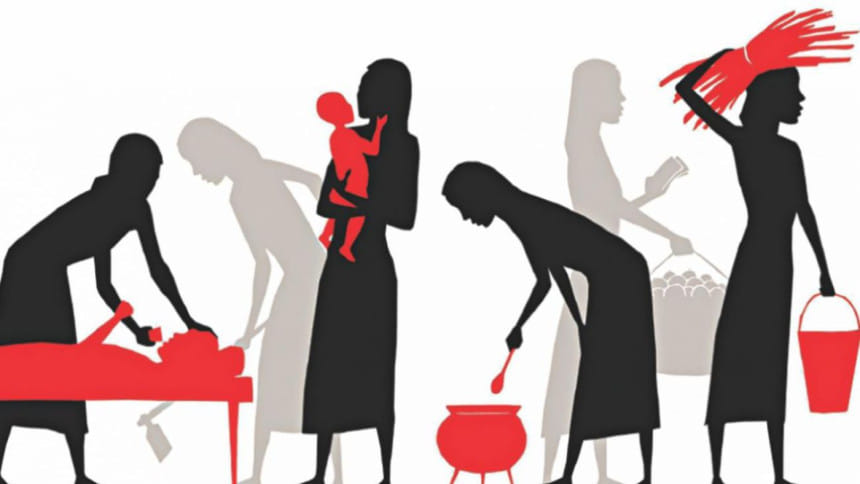Family Life During Pandemic: Lost rhythm in new reality

It was not the family reunion that she had hoped for.
In May last year, Fahmida Akhter (not her real name) returned to her village home in Bogura district after losing her job as a medical assistant at a private hospital in Dhaka. The 32-year-old lost her job, as others like her did, when doctors halted their private practices at the beginning of the coronavirus pandemic.
Her husband, a recent undocumented migrant to Germany, also returned home in June after struggling to find a job for seven successive months during which Covid-19 broke out and lockdown ensued in the European nation.
While she had been working in Dhaka and her husband trying his luck abroad, she had been forced to leave their child in the care of his grandmother in their village. The small family had not lived together under one roof in the last five years.
But since their long-awaited reunion in June, the couple and their eight-year-old son have been living in severe financial hardship with no work and their savings run out.
"It really hurts when you fail to afford the food your eight-year-old son wants to eat. I don't have the balance in my phone to call my dearest ones to share my feelings, or contact people for a job," said Fahmida.
More worryingly, domestic violence has become a frequent affair.
She said her husband has increasingly become frustrated -- unable to repay Tk 25,000 he had borrowed from relatives as well as not being able to find a job to support the family.
"Last month, for the first time in my life, he beat me severely after a heated argument. I couldn't protest since I don't have the option of taking a break from this life," said Fahmida.
"Now I'm worried about our son, as he never saw us quarrelling before. I know we are just going through bad days -- still it has become incredibly difficult to cope with this suddenly changed situation."
NEW REALITIES
Financial hardship and a lack of social activities have led to increased rifts among families, shows a recent survey by Manusher Jonno Foundation.
From April till September last year, a total of 37,912 women from districts in its working areas said they faced domestic violence. Of them, 16,485 women had suffered such violence for the first time in their lives, said the survey report.
Since children are staying at home more, they are also at risk of abuse. At least 1,387 children faced abuse in the first half of 2020, according to Bangladesh Shishu Adhikar Forum (BSAF).
The added burden of unpaid care and domestic work also became a major issue among families, as the pandemic-caused shutdown disproportionately affected women, even though they said men have been participating in housework more compared to pre-coronavirus times.
Young female professionals said millennial men were still not holding up their end of household duties and they found that happiness and peace in their marriages hinged on whether or not they had domestic help.
"When men can pay a woman to do their share of work, they will, and when they can't pay, they expect the one they married to replace the one they paid," said Elina Rahman, a young professional based in Dhaka.
"We used to have a domestic help coming in three times a week but after that service was stalled during the pandemic, we would end up having raging fights about cleaning the house. My husband refused to pitch in and would say that he is tired of doing chores, not respecting the fact that when he doesn't pull his weight -- I have to be the one to do it."
A rapid assessment by Brac's Gender, Diversity and Justice Programme early on during the pandemic found 91 percent of 557 women working in both formal and informal sectors reported doing higher amounts of unpaid care work, and 89 percent reported having no leisure time at all.
Brac's findings also warned of a negative impact on women's mental health as a result of the extra work.
The pandemic created stress and anxiety for many families -- worries about jobs, money, new realities of working from home, and the mental effects of reading and hearing of illnesses and deaths on social and mainstream media.
Lack of sufficient personal space, the pressures of doing more child and elderly care, not being able to engage in social activities or meet people they love, also impacted many.
UNCERTAIN TIMES
Mostafizur Rahman, a mid-career researcher, said he reassessed his career priorities during this time. "My job sector [development] has been impacted financially. Therefore, I am planning to switch my job."
However, securing a new job is tricky at a time when the local and global job market has been shaken up and uncertainty reigns.
He said he had otherwise been excited to enjoy the "new normal", as he relished the opportunity to spend more time at home with his only son, work with less commuting, and enjoy a slower pace of life in general.
Work from home provided busy professionals like him the unexpected opportunity to enjoy quality time with their families -- allowing them to share meals at home and spend more time with elderly parents and young children.
"However, I found the real-life experience to be different and I am still struggling to strike a better balance between work and family life," Mostafizur said.

 For all latest news, follow The Daily Star's Google News channel.
For all latest news, follow The Daily Star's Google News channel. 



Comments